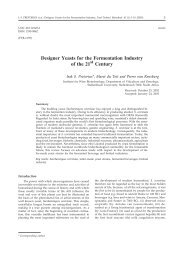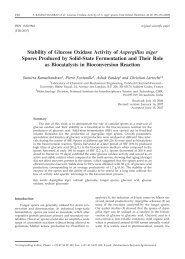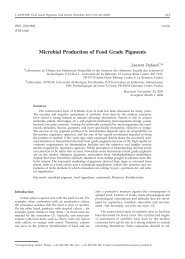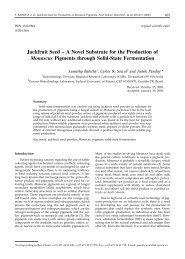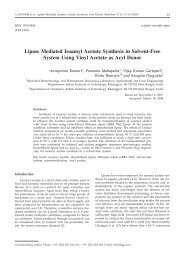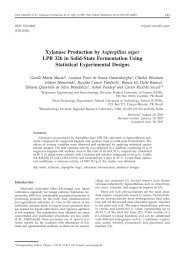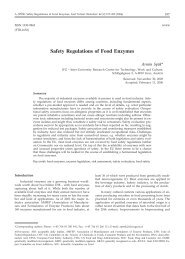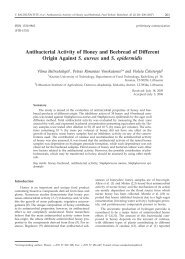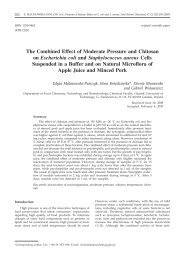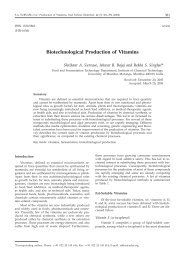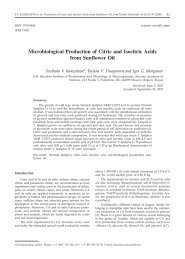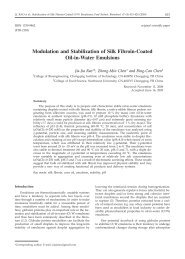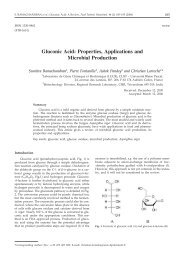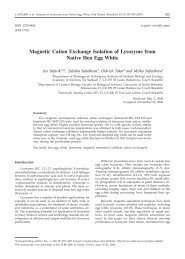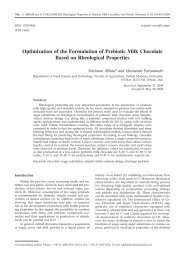A Review - Food Technology and Biotechnology
A Review - Food Technology and Biotechnology
A Review - Food Technology and Biotechnology
Create successful ePaper yourself
Turn your PDF publications into a flip-book with our unique Google optimized e-Paper software.
B. KOSIN <strong>and</strong> S.K. RAKSHIT: Criteria for Production of Probiotics, <strong>Food</strong> Technol. Biotechnol. 44 (3) 371–379 (2006)<br />
373<br />
cess, storage conditions, the product’s shelf life, <strong>and</strong> the<br />
distribution times.<br />
Thermophilic LAB (T-LAB)<br />
Thermophilic lactic acid bacteria (T-LAB) are well-<br />
-known for their biotechnological importance in the production<br />
of cheeses <strong>and</strong> fermented milk, which all require<br />
incubation of milk or curd at a relatively high<br />
temperature (45 °C or above) during their production<br />
process. Thermophilic bacteria that are mainly used as<br />
dairy starters belong to three species: Streptococcus thermophilus,<br />
Lactobacillus helveticus, <strong>and</strong> Lactobacillus delbrueckii<br />
ssp. bulgaricus or lactis (17,18). L. casei <strong>and</strong> L.<br />
plantarum are also grouped in thermophiles <strong>and</strong> used in<br />
dairy products. Delcour et al. (19) have reviewed the genetic<br />
<strong>and</strong> other important characteristics required to underst<strong>and</strong><br />
T-LAB. The manner in which they exploit milk<br />
protein <strong>and</strong> sugar, adapt to stress, <strong>and</strong> horizontally exchange<br />
genetic information which may help in screening<br />
the T-LAB from the available sources is described in the<br />
following paragraphs.<br />
Proteolytic systems<br />
The ability to produce a cell wall-bound extracellular<br />
proteinases (CEP) is a very important feature of<br />
T-LAB in the hydrolysis of milk proteins (casein), providing<br />
the cells with the amino acids that are essential for<br />
growth of LAB. Cell envelope-associated proteinases are<br />
detected <strong>and</strong> characterized in various thermophilic lactobacilli<br />
(20–23). Genes encoding a cell wall-bound protease<br />
in T-LAB are prtB, prtH, prtY <strong>and</strong> prtS. For LAB<br />
peptidases, gene encoding are PepC, PepN, PepS <strong>and</strong><br />
PepO. Screening of thermophilic/thermotolerant lactobacilli<br />
based on proteolytic activity is another method to<br />
identify thermophilic probiotics with the information of<br />
the cell wall-bound proteinase characteristics. Further<br />
genetic information is considered useful to improve know<br />
ledge of the functional properties of LAB <strong>and</strong> T-LAB.<br />
Stress response<br />
During the yogurt <strong>and</strong> cheese making process, T-LAB<br />
are exposed to various changes in environmental parameters<br />
(heat, acidity, salt, cold, etc.) <strong>and</strong> induce adaptive<br />
responses allowing them to cope with the resulting physiological<br />
stresses (19). The GroES, GroEL, <strong>and</strong> DnaK<br />
proteins were found to be both heat- <strong>and</strong> acid-shock inducible<br />
in L. delbrueckii ssp. bulgaricus. A gene encoding<br />
a small 17 kDa heat-shock protein widely distributed in<br />
prokaryotic <strong>and</strong> eukaryotic organisms was reported to<br />
be plasmid-encoded in various S. thermophilus strains<br />
(24,25).<br />
Other important genetic information on characteristics<br />
of T-LAB are sugar uptake <strong>and</strong> glycolysis, catabolite<br />
repression, exopolysaccharides, horizontal gene transfer,<br />
bacteriophage resistance, etc. (19). Such fundamental<br />
knowledge can be applied in the future for the improvement<br />
of T-LAB starters <strong>and</strong> in other fields of study using<br />
these microorganisms for further applications.<br />
Recent Studies on Processing of<br />
Thermophilic/Thermotolerant Lactic<br />
Acid Bacteria<br />
A major challenge associated with the application of<br />
probiotic cultures in functional foods is the retention of<br />
viability during processing. Some studies have demonstrated<br />
that following spray drying, probiotics show increased<br />
sensitivity to cell wall, cell membrane <strong>and</strong> DNA<br />
damage (26,27). A number of approaches have been examined<br />
with a view of improving culture viability during<br />
spray drying. The survival of thermophilic probiotic cultures<br />
(e.g. L. paracasei) during cheese making <strong>and</strong> spray<br />
drying has been successful. Up to 49 % survival was obtained<br />
following spray drying at an outlet temperature<br />
of 80–85 °C (13). Some thermophilic lactic acid bacteria<br />
isolated <strong>and</strong> identified from dairy products (28) were<br />
classified as Lactobacillus delbrueckii ssp. lactis <strong>and</strong> ssp.<br />
bulgaricus, L. helveticus <strong>and</strong> L. acidophilus. Nitisinprasert<br />
et al. (29) successfully isolated effective thermotolerant<br />
lactobacilli which exerted broad spectrum inhibition specific<br />
(SIS) results from chicken intestine <strong>and</strong> they were<br />
classified as Lactobacillus reuteri. Identification of new thermotolerant<br />
species of lactic acid bacteria isolated from<br />
animal hosts like chicken has been conducted recently<br />
using molecular identification method. New isolated thermotolerant<br />
species from chicken faeces are Lactobacillus<br />
thermotolerans (30) <strong>and</strong> Lactobacillus aminata sp. nov., <strong>and</strong><br />
some species belong to Lactobacillus paraplantarum (31).<br />
The effect of heat shock <strong>and</strong> the induction of a stress<br />
response in Lactobacillus spp. have been studied for several<br />
thermophilic LAB (13,32–39). Methods of heat tolerance<br />
of mesophilic Lactobacilli are studied using pressure<br />
pretreatment on human origin L. rhamnosus GG<br />
(40). Cells exposed to pressure pretreatment showed<br />
higher survival than untreated cells when exposed to<br />
high temperature at 60 °C <strong>and</strong> heat adapted method<br />
showed greater thermotolerance compared to the control<br />
(40,41). Heat adaptation with cross-protection (e.g.<br />
heat exposure <strong>and</strong> simultaneous exposure to sublethal<br />
levels of hydrogen peroxide or bile salts or NaCl) was<br />
also studied to induce against heat stress of L. paracasei<br />
ssp. paracasei (41). The effect of a combination of factors<br />
(e.g. ethanol <strong>and</strong> pH) on heat resistance of thermophilic<br />
L. delbrueckii was investigated by Casadei et al. (42). Silva<br />
et al. (43) showed the induction of stress tolerance by the<br />
addition of sucrose to the growth medium as the accumulated<br />
compatible solutes during short period of drying<br />
process <strong>and</strong> storage. Saarela et al. (44) reported that<br />
sublethal treatments of acid <strong>and</strong> heat treatments of stationary<br />
phase probiotic cultures (Lactobacilli strains) improved<br />
the viability <strong>and</strong> enhanced their survival during<br />
lethal treatments <strong>and</strong> their ability to adapt these treatments<br />
at fermentor-scale production of probiotic cultures.<br />
Therefore, strain-specific treatments <strong>and</strong> sublethal treatments<br />
of specific growth phase probiotic cells can be utilized<br />
in the production of probiotic cultures with improved<br />
viability. The methods of pretreatment, heat<br />
adaptation <strong>and</strong> other factors that affect such investigation<br />
are very important for further studies on the viability<br />
of probiotic bacteria during heat processing.<br />
Study of fatty acid modification in relation to the<br />
temperature is also a method to discriminate T-LAB



